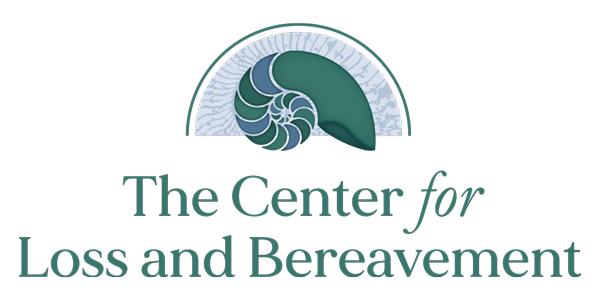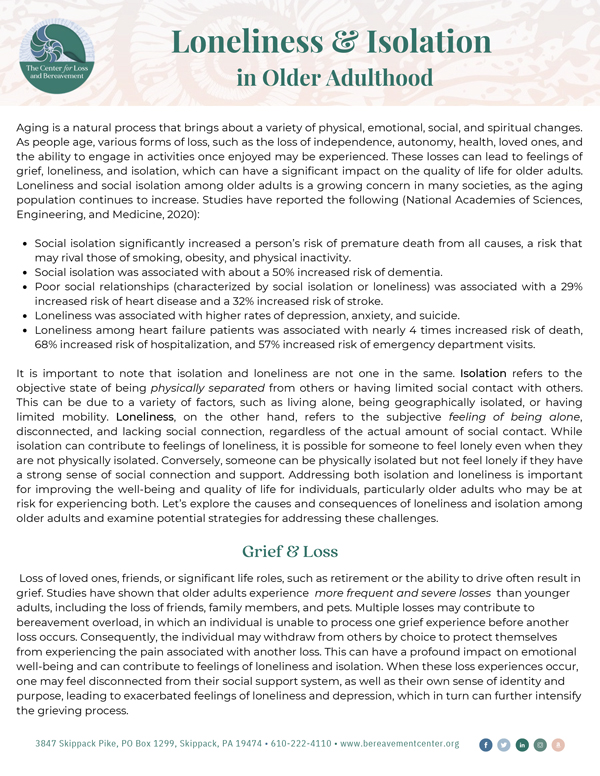CLB Tip Sheets
Loneliness & Isolation in Older Adulthood
Aging is a natural process that brings about a variety of physical, emotional, social, and spiritual changes. As people age, various forms of loss, such as the loss of independence, autonomy, health, loved ones, and the ability to engage in activities once enjoyed may be experienced. These losses can lead to feelings of grief, loneliness, and isolation, which can have a significant impact on the quality of life for older adults. Loneliness and social isolation among older adults is a growing concern in many societies, as the aging population continues to increase. Studies have reported the following (National Academies of Sciences, Engineering, and Medicine, 2020):
- Social isolation significantly increased a person’s risk of premature death from all causes, a risk that may rival those of smoking, obesity, and physical inactivity.
- Social isolation was associated with about a 50% increased risk of dementia.
- Poor social relationships (characterized by social isolation or loneliness) was associated with a 29% increased risk of heart disease and a 32% increased risk of stroke.
- Loneliness was associated with higher rates of depression, anxiety, and suicide.
- Loneliness among heart failure patients was associated with nearly 4 times increased risk of death, 68% increased risk of hospitalization, and 57% increased risk of emergency department visits.
It is important to note that isolation and loneliness are not one and the same. Isolation refers to the objective state of being physically separated from others or having limited social contact with others. This can be due to a variety of factors, such as living alone, being geographically isolated, or having limited mobility. Loneliness, on the other hand, refers to the subjective feeling of being alone, disconnected, and lacking social connection, regardless of the actual amount of social contact. While isolation can contribute to feelings of loneliness, it is possible for someone to feel lonely even when they are not physically isolated. Conversely, someone can be physically isolated but not feel lonely if they have a strong sense of social connection and support. Addressing both isolation and loneliness is important for improving the well-being and quality of life for individuals, particularly older adults who may be at risk for experiencing both. Let’s explore the causes and consequences of loneliness and isolation among older adults and examine potential strategies for addressing these challenges.
Grief & Loss
Loss of loved ones, friends, or significant life roles, such as retirement or the ability to drive often result in grief. Studies have shown that older adults experience more frequent and severe losses than younger adults, including the loss of friends, family members, and pets. Multiple losses may contribute to bereavement overload, in which an individual is unable to process one grief experience before another loss occurs. Consequently, the individual may withdraw from others by choice to protect themselves from experiencing the pain associated with another loss. This can have a profound impact on emotional well-being and can contribute to feelings of loneliness and isolation. When these loss experiences occur, one may feel disconnected from their social support system, as well as their own sense of identity and purpose, leading to exacerbated feelings of loneliness and depression, which in turn can further intensify the grieving process.
Physical Changes
Physical changes associated with aging can result in reduced ability to perform activities of daily living, maintain independence, and participate in social activities. These limitations can lead to decreased social engagement and increased isolation. Chronic health conditions can also limit mobility and contribute to social isolation. Additionally, hearing and vision impairments, cognitive decline/impairments, and memory loss can make it more difficult to communicate with others, leading to a sense of disconnection and loneliness. Grief and loss can also impact physical changes, leading to sleep disturbances, decreased appetite, and increased risk of chronic health conditions.
Emotional Changes
As people age, a range of emotional changes may be experienced, including increased anxiety, depression, and stress. Strokes and dementia can alter personality and emotional states, resulting in depressed moods, lack of interest, and angry outbursts, all of which can affect social interaction. These emotional challenges can make it more difficult to connect with others and engage in social activities. Moreover, older adults may face unique emotional challenges related to grief and loss, such as the death of loved ones, retirement, loss of home, loss of identity, and changes in their own health status. These losses can lead to feelings of sadness, separateness, and lonesomeness.
Social Changes
Social isolation is a significant concern among older adults, as it can lead to negative health outcomes such as depression, cognitive decline, and physical decline. Social seclusion and solitude among older adults are often linked to changes in social networks. For example, older adults may experience changes in their living situations, such as moving to a retirement community or assisted/skilled living facility, which can disrupt social connections and lead to feelings of loneliness. Furthermore, older adults may experience the loss of friends and family members, which can reduce the size of their social networks and increase feelings of isolation.
Spiritual Changes
Older adults may experience spiritual changes, such as a shift in religious beliefs or practices. These changes can lead to feelings of disconnection from religious communities or spiritual practices. Moreover, spiritual changes may also lead to a sense of existential questioning, including reflection on life experiences, reevaluation of priorities, and searching for life’s meaning and purpose, which can be emotionally challenging and contribute to feelings of separateness and seclusion.
Strategies to Help Loneliness & Isolation
One of the key challenges of addressing loneliness and isolation among older adults is that it can be difficult to identify those who are experiencing these feelings. Many older adults may be hesitant to talk about their feelings of aloneness and seclusion, either because they feel ashamed or because they do not want to burden others with their problems. Additionally, many older adults may not have access to resources and support such as social programs or mental health services. Despite these challenges, there are a variety of strategies that can help improve the well-being and quality of life among older adults dealing with loneliness and isolation.
CONNECT: Staying connected with friends, family members, and the community can help reduce feelings of being alone and isolated and provide a sense of belonging and purpose. This can involve participating in social activities, volunteering, and attending religious services. Many volunteer opportunities are available online.
FIND SUPPORT: Joining a support group for individuals who have experienced similar losses or challenges can provide a sense of community and support. Working with a mental health professional can also help older adults process feelings of grief and sadness, as well as develop coping strategies to address loneliness and isolation.
UTILIZE TECHNOLOGY: Using technology (cell phones or computers) through video chats and social media can help older individuals stay connected with friends and family members who may not live nearby.
ACCESS TRANSPORTATION: Transportation services can provide access to social activities and events that those who no longer drive may not be able to participate in otherwise.
PHYSICAL & MENTAL ACTIVITY: Regular physical activity can help maintain health and mobility, as well as provide opportunities for social involvement. Engaging in activities that challenge the mind and promote mental sharpness can slow cognitive decline.
SUPPORT SPIRITUAL NEEDS: Many individuals find comfort, community, connection, and meaning in spirituality or faith. Participating in or accessing spiritual support can help meet these needs.
CULTIVATE INTERESTS: Restart an old hobby or take a class to learn something new. Sign up for an online or in-person class at your local public library, community center, or assisted living facility.
PET THERAPY: Studies show that engaging with and connecting to animals can lower blood pressure, calm anxiety, and bring a sense of well-being to participants. Many assisted living facilities offer pet therapy for residents. Some assisted living facilities are pet-friendly, permitting residents to have a pet. Older adults may consider adopting a pet if they are able to care for them.
ACCESS HOME CARE SERVICES: Older adults that struggle with physical decline or limitations may find home care services helpful as aides can provide support with activities of daily living and other tasks, as well as provide social interaction and engagement.
ASSISTED LIVING FACILITIES: For older adults that require more support or care, assisted living facilities can provide a community environment with access to social activities and services.
The changes and challenges faced by older individuals require attention and support from healthcare providers, family members, and the community at large. Addressing physical and mental health needs, promoting social connections, enhancing interests, and accessing services that promote autonomy are important strategies for improving the well-being and quality of life for older individuals and can help ensure that independence, dignity, and social engagement are maintained.
If you are looking for individual or group grief support, please reach out to our intake coordinator at 610-222-4110
Centers for Disease Control (CDC) (2021) – Alzheimer’s Disease and Healthy Aging
National Academies of Sciences, Engineering, and Medicine. 2020. Social Isolation and Loneliness in Older Adults: Opportunities for Health Care System. Washington, DC: The National Academies Press.
National Institute on Aging (NIA) (2021)
National Institute of Mental Health (NIMH) (2018)
Join Our
Mailing List
Donate
Today
Request
Information

Affiliations
• NACG
• CBEM Changemaker
• ADEC
• Charity Navigator
Quick Links
About Us
Individual & Family Grief Counseling
Volunteer
News
Grief Support Resources
Contact
Ph: 610-222-4110
Fax: 610-222-4116
3847 Skippack Pike
P.O. Box 1299
Skippack, PA 19474
Support The Center For
Loss and Bereavement
